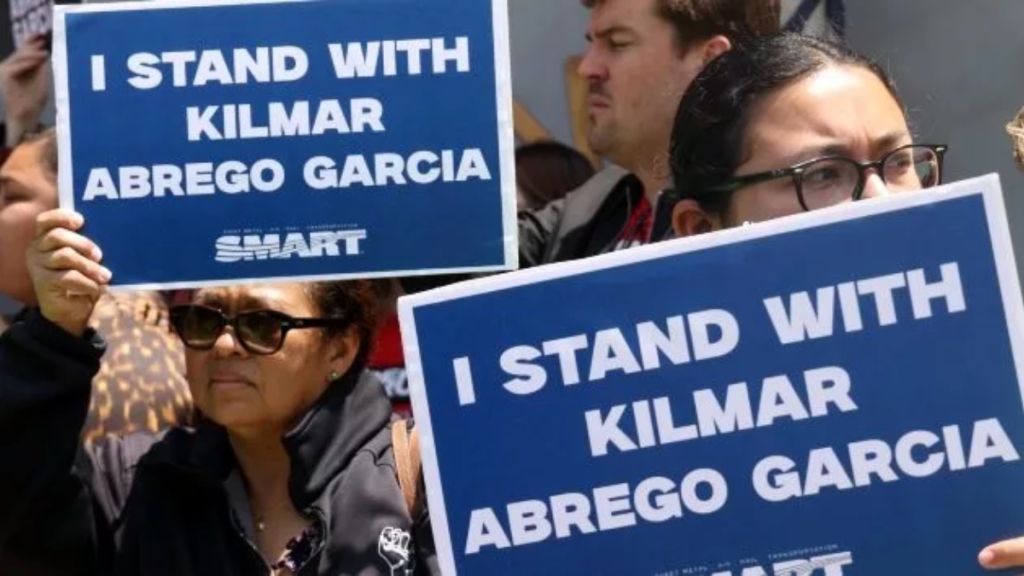In a key development in a contentious immigration legal battle, a federal judge has issued a one-week pause in discovery proceedings related to the deportation of Kilmar Abrego Garcia.
The temporary halt, ordered by U.S. District Judge Paula Xinis, offers the federal government a short reprieve as it attempts to respond to allegations that it violated court orders in the controversial deportation of the Salvadoran national.
Garcia was deported from the United States despite a judicial directive that had explicitly barred his removal. The delay in discovery proceedings is expected to give the U.S. Department of Justice time to comply more fully with court-ordered actions and clarify the steps it has taken since the unlawful deportation occurred.
Who is Kilmar Abrego Garcia?
Kilmar Abrego Garcia, a Salvadoran immigrant with a pending asylum claim, was living in the U.S. when federal immigration agents deported him earlier this year. His legal team contends that the removal was carried out in defiance of existing court orders that protected him from deportation while his appeal was under review.
The incident has drawn national attention, sparking questions about government accountability and due process in the handling of sensitive immigration cases.
The case became more high-profile after the Supreme Court intervened, issuing a temporary administrative stay on an earlier lower court ruling that ordered Garcia’s return to the U.S. This procedural move gave the government an opportunity to argue why compliance with the lower court’s order should be postponed.
Why the Pause in Discovery?
Judge Xinis granted the one-week pause in discovery to allow time for federal attorneys to produce relevant documentation and provide updates on efforts to return Garcia to the United States. The discovery process had initially been authorized to determine whether federal officials acted in bad faith by ignoring court orders.
Legal experts believe the judge’s temporary order signals frustration with the pace and transparency of the government’s actions. The court has emphasized that any delay in remedying the situation risks further harm to Garcia, who remains in custody in El Salvador.
According to court filings, Garcia is currently detained in harsh conditions that his attorneys describe as life-threatening.

Government Response and Legal Reactions
The Department of Justice has argued that the deportation was an administrative error and has cited logistical and diplomatic hurdles as reasons for the delay in bringing Garcia back to the U.S. However, Judge Xinis and other legal observers remain unconvinced, citing the government’s vague responses and perceived unwillingness to fully comply with the court’s orders.
Garcia’s legal team contends that the government’s behavior violates his constitutional rights, especially due process protections guaranteed under U.S. law. They claim the government’s resistance to full discovery proceedings is part of a broader pattern of evasion and institutional neglect.
In a strongly worded opinion, Judge Xinis criticized the government’s conduct, accusing it of “bad faith” and emphasizing that “facilitating return” requires actual action, not mere verbal assurances.
Broader Implications for Immigration Policy and Judicial Authority
The case has rapidly become a flashpoint in debates over executive power, immigration enforcement, and the independence of the judiciary. Critics of the government’s handling argue that failure to respect court orders undermines democratic checks and balances.
Legal scholars warn that the precedent set by this case could impact future immigration disputes and possibly embolden federal agencies to ignore judicial oversight. The controversy underscores tensions between branches of government and shines a spotlight on the human toll of administrative decisions.
Civil rights organizations, including the ACLU, have condemned the deportation and called for increased oversight of federal immigration practices. Advocates are urging Congress to investigate and ensure that court rulings are respected by all federal agencies, regardless of political context.
What Happens Next?
The temporary pause in discovery is set to expire next week. If the government fails to demonstrate compliance by that time, Judge Xinis may reauthorize discovery or issue a more severe judicial remedy, including potential contempt proceedings against federal officials.
Garcia’s attorneys plan to submit new filings demanding concrete evidence that efforts are being made to secure his return. The case is also expected to face further review by the Supreme Court, which could issue a ruling with broad implications for immigration law and executive accountability.
As this legal battle unfolds, it continues to highlight the importance of judicial oversight, the limits of executive discretion, and the need to uphold constitutional protections in all government actions.
Conclusion
The one-week discovery pause in the Abrego Garcia deportation case underscores deep tensions between the judiciary and the executive branch.
With federal courts demanding accountability and transparency, the next developments in this case could reshape the legal landscape of immigration enforcement and set a precedent for future deportation disputes.
For more details on the court’s intervention and related immigration law proceedings, visit NBC News.
Disclaimer – Our team has carefully fact-checked this article to make sure it’s accurate and free from any misinformation. We’re dedicated to keeping our content honest and reliable for our readers.
